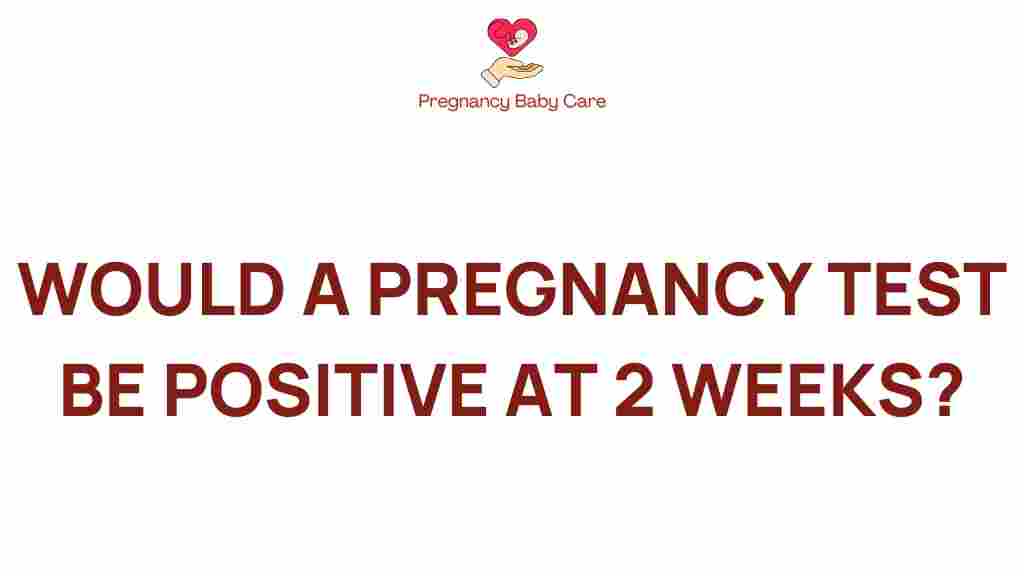Unraveling the Mystery: Can a Pregnancy Test Detect at 2 Weeks?
When it comes to understanding pregnancy, one of the most common questions is whether a pregnancy test can accurately detect pregnancy at just two weeks after conception. This is a critical period for many women who are eager to know if they are expecting. In this article, we will explore how pregnancy tests work, the importance of early detection, and what symptoms may indicate pregnancy during this time. Additionally, we will discuss hCG levels, testing accuracy, and what to consider if you miss your period.
Understanding Pregnancy Tests
Pregnancy tests are designed to detect the hormone human chorionic gonadotropin (hCG) in the urine or blood. This hormone is produced shortly after a fertilized egg implants itself in the uterus, which typically occurs about 6 to 12 days post-conception. Here are the key points to consider:
- Types of Tests: There are two main types of pregnancy tests: urine tests, which are available over the counter, and blood tests, which are conducted in a medical facility.
- How They Work: Pregnancy tests work by detecting hCG levels. A positive result indicates that hCG is present, suggesting pregnancy.
- Timing: The accuracy of a pregnancy test generally increases the longer you wait after conception. Testing too early can lead to false negatives.
Early Detection: The Two-Week Wait
The two-week wait (TWW) refers to the time between ovulation and the expected onset of a menstrual period. During this time, many women are keen to test for pregnancy. Here’s what to know about early detection:
1. **Timing of Testing**: Most home pregnancy tests claim to be able to detect pregnancy as early as the first day of a missed period. However, testing at two weeks post-ovulation may yield varying results based on individual hCG levels.
2. **hCG Levels**: After conception, hCG levels rise rapidly. By about one week after implantation, hCG can often be detected in urine. However, levels can vary significantly from woman to woman.
3. **Testing Accuracy**: While some sensitive tests can detect low levels of hCG, many standard tests may not provide accurate results until after a missed period. It is essential to check the sensitivity of the pregnancy test you are using.
Common Pregnancy Symptoms at Two Weeks
As you approach the two-week mark, some women may begin to notice early pregnancy symptoms. Although these symptoms can vary, here are some common signs:
- Missed Period: A missed period is often the first sign of pregnancy, but it may not occur until after two weeks.
- Hormonal Changes: Fluctuations in hormones can lead to symptoms such as mood swings, fatigue, and breast tenderness.
- Nausea: Some women may experience nausea or morning sickness as early as two weeks after conception.
- Increased Urination: Hormonal changes may lead to increased urination.
Step-by-Step Process for Testing
If you suspect you may be pregnant and are considering taking a pregnancy test at two weeks post-conception, here is a step-by-step guide:
- Choose a Reliable Test: Select a pregnancy test that is known for its sensitivity. Look for tests that can detect hCG levels as low as 10 mIU/ml.
- Read Instructions: Carefully read the instructions provided with the test to ensure accurate results.
- Timing: For best results, use the test with your first morning urine, as it contains the highest concentration of hCG.
- Follow the Procedure: Follow the instructions for either dipping the test strip into urine or using the test with a urine sample.
- Wait for Results: Allow the test to process for the recommended time, usually a few minutes.
- Interpret Results: Check the test for the presence of a control line and a test line. A positive result will show two lines.
Troubleshooting Testing Issues
Sometimes, pregnancy tests may produce unclear results. Here are some common troubleshooting tips:
- False Negatives: If you receive a negative result but still suspect pregnancy, wait a few days and test again. Your hCG levels may not be high enough yet.
- False Positives: While rare, false positives can occur due to certain medical conditions or medications. Consult your doctor for further evaluation.
- Expired Tests: Always check the expiration date on the test. An expired test may not provide accurate results.
When to Consult a Doctor
If you receive a positive pregnancy test or continue to experience pregnancy symptoms, it is advisable to make an appointment with your healthcare provider. They can confirm the pregnancy through a blood test and provide guidance on the next steps.
Conclusion
In summary, while a pregnancy test can potentially detect pregnancy at two weeks post-conception, the accuracy largely depends on individual hCG levels and the sensitivity of the test used. Waiting until after a missed period can provide more reliable results. If you experience symptoms of pregnancy or have questions about your testing accuracy, do not hesitate to consult your healthcare provider for assistance.
For more information on pregnancy tests and how they work, visit Healthline. If you have questions regarding early pregnancy symptoms and their implications, check out our detailed guide here.
This article is in the category Pregnancy and created by PregnancyBabyCare Team
